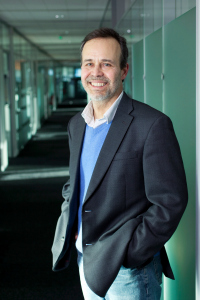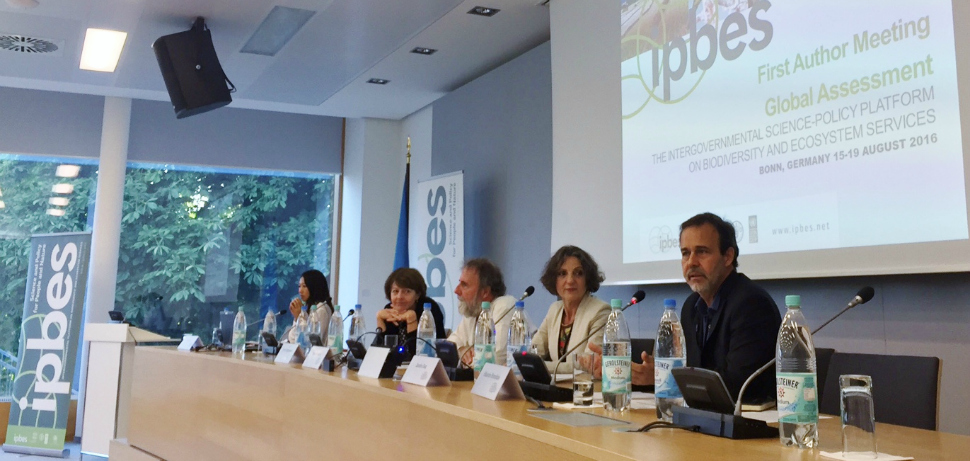Betsy Piland, September 3, 2016
Science tells us that everything we depend on for a decent quality of life is tied to Mother Nature?s health. Yes, everything-from nutritious food and clean water to energy production, poverty management and even peace in society.
?We take healthy ecosystems for granted,? says IU anthropology professor Eduardo Brondizio (at the far right in the above photo), who has been named a co-chair of a new global assessment commissioned by the Intergovernmental Science-Policy Platform on Biodiversity and Ecosystem Services (IPBES), a consortium of 125 governments from across the globe.?
The director of the Center for the Analysis of Social-Ecological Landscapes, Brondizio has a background in field-based work across rural and urban landscapes as well as significant research qualifications in networks and systems. All of which comes into play when looking at global problems and solutions.
Brondizio says the basic building blocks of a healthy ecosystem - like air and water - are often ignored and require study to sustain life.
 ?All those elements are part of ecosystem processes and biodiversities that function together to provide those underlying foundations for the needs that we have-not only the material needs, but our emotional and spiritual needs as well, says Brondizio. ?Many of those conditions are in decline or suffering over exploitation.?
?All those elements are part of ecosystem processes and biodiversities that function together to provide those underlying foundations for the needs that we have-not only the material needs, but our emotional and spiritual needs as well, says Brondizio. ?Many of those conditions are in decline or suffering over exploitation.?
Brondizio explained that these ecosystem services haven?t been thoroughly studied in more than a decade, but he and his IPBES colleagues are working on it. Fresh from the first authors meeting in Bonn, Germany, Brondizio and his co-chairs Sandra Diaz of Argentina and Josef Settele of Germany, along with more than 130 experts from around the world, kicked off a three-year collaboration to publish the Global Assessment on Biodiversity and Ecosystem Services.
?It is an ambitious undertaking, but we have a whole infrastructure to support us in this process. [Diaz and Settele] both have extensive experience with this kind of large-scale assessment, and we bring together a good mixture of the natural sciences and the social sciences.?
Ultimately, the IPBES Global Assessment will look at biodiversity and ecosystem trends from the past 50 years and how they are affecting different aspects of human well-being today. Then it will explore what can be done over the next 20 to 30 years to achieve a more sustainable society.
Brondizio gave some insight into what their week-long authors meeting was like. ?It's a very dynamic, intensive process. We're talking 14, 16 hours a day. You're looking at what the scientific literature offers but also pushing the boundaries. We have this challenge of incorporating the knowledge that is not necessarily in the scientific literature-some of it is, but not all-to have a richer perspective on the environment and biodiversity.?
The Global Assessment will be comprised of three sections, with the first looking at different environmental and social indicators over the past 50 years. Brondizio says it will include a detailed analysis of trends in the use of resources, agriculture, fisheries, pollution and population. ?For instance,? says Brondizio, ?In the 1970s there were incredible amounts of pollution here. Today the environment is much cleaner, but at the same time you have a displacement of that pollution to somewhere else. You have all kinds of trends of improvements, declines, shifting from region to region. Now we will have a global view of those trends and what explains them.?
The second part of the Global Assessment will look at establishing goals for preserving biodiversity and sustainable development. Brondizio explained that these will build upon the Millennium Assessment Goals set in 2000, which he said were mainly focused on poverty and basic conditions, including a status check on the goals.
Brondizio says that one goal that has advanced significantly was the effort to increase the number of protected environments like national parks. But a goal that has not been met is the management of global fisheries, leading to the decline of many key species of fish around the globe.
Finally, the conclusion of the Global Assessment will look at policymaking. Brondizio and his coauthors will look at what policies have been successful in improving environmental conditions, evaluate whether they have succeeded or not and then provide suggestions on policies that have the best chance to improve pathways to a more sustainable environment and society.
As for the publication timeline, Brondizio says that it is a very structured years-long process with multiple drafts and reviews. ?The Global Assessment will be delivered by May 2019, and that's important because we are going to be delivering this assessment in time to inform [the Fifth Global Biodiversity Outlook (GBO-5) of the Convention on Biological Diversity in 2020].?
?There are two things we want to see come out of this,? says Brondizio. ?First is an understanding of the importance of biodiversity and ecosystems to society. The other, of course, is to point to possible pathways and policies that would help achieve a more sustainable future, improving the environment for large sectors of society who suffer the consequence environmental degradation.?
Photo credit: IPBES Secretariat







